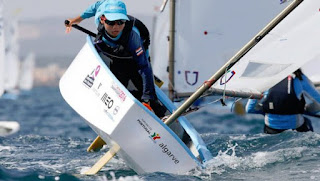A Sad Day for Sailing
A Sad Day for Sailing - by Jean-Pierre Kiekens
 Today, the delegates of the World Sailing Council are asked to either vote for their conscience or for offshore.
Today, the delegates of the World Sailing Council are asked to either vote for their conscience or for offshore.This is a sad day for sailing.
(if you prefer to read this article in French, click here)
Just a few months ago, I was told what happened with a protest at a prominent international youth regatta. The sailor was clearly in the wrong, and he knew it. In front of the jury, the sailor attempted an explanation, but unconvincingly. Most of us have gone through that. Nothing exceptional.
But what occurred then was much more interesting. The jury explained at lengths, an in a very pedagogical manner, what the sailor should have done. In this particular case, it was to have retired from the race. Yes there was a sanction, a disqualification, but much more importantly, the Jury acted in a very sensible way, explained at lengths its decision, and provided this youth sailor with a lesson. A lesson for life.
The lesson was simply that, in life, it's important to do the right thing.
The sailor continued the championship, and did well. Life goes on.
One of the two Basic Principles in the Racing Rules of Sailing clearly states:
« A fundamental principle of sportsmanship is that when competitors break a rule they will promptly take a penalty, which may be to retire. »
One of the reasons sailing is such a great sport is that sailors, from a very young age, are brought to know such principles. They are brought to know what sportsmanship is all about.
Without sportsmanship, there is no real sailing.
Now let’s contrast this with the decision that World Sailing Council delegates are facing today on their pre-Christmas conference call, regarding the future of Olympic classes.
The delegates are asked to approve the minutes of the World Sailing Sarasota meeting that took place from October 27 to November 4.
In particular, they are asked to approve the vote on Submission 037-18 that brought the replacement of the Finn - in the context of the mixed single-handed dinghy decision made in May in London - by offshore sailing.
Following the publication by World Sailing of the results of the vote, which was supposed to be a secret ballot, a huge controversy has arisen, shedding doubts about the very credibility of World Sailing as the governing body of the sport.
Here are some of the key issues that are now well documented:
- At least 4 delegates, out of 41, assert that their votes have been mis-recorded. These are 4 delegates who had publicly stated they were against the submission. There is in fact a fifth contentious vote, according to an audit report ordered by World Sailing.
- Member National Authorities were told after the May 2018 London meeting that they were not allowed to present new submissions regarding classes for the 2024 Olympics, yet this is exactly what was done by World Sailing President Kim Andersen, when he introduced Submission 037-18 just at the Sarasota conference.
- Normally, the chair of a meeting must remain impartial and refrain from taking advocacy positions; yet what World Sailing President has done for over a year now is to strongly promote offshore sailing, while the Member National Authorities had actually formally rejected it last May.
- The Haysmacintyre audit report, ordered by World Sailing, did not look in any depth into the integrity of the voting at Sarasota. Haysmacintyre are chartered accountants and tax advisers, and are not the kind of company with the skills to analyze the integrity of such vote.
- The electronic device used in Sarasota for the voting was actually not a professional, secure, reliable voting system, but was an « Audience Response System » geared towards powerpoint presentations in classrooms, with multiple testimonies of unreliability, and with video-taped proofs of malfunctioning at the Sarasota conference.
There has been over the past months lots of behind the scenes tractations. Yet all the demands made by Member National Authorities to World Sailing to simply have a new vote have been rejected so far by the World Sailing President and Executive Director.
What is clear is that a new vote would not reach the required 75% threshold and would lead to a rejection of Submission 037-18. And that means a rejection of offshore sailing at the Paris 2024 Olympics.
But the approval of the contentious Sarasota minutes require only a 50% threshold ...
It would take just a few minutes to redo a vote. Or to proceed with a ratification of the vote. But that will not happen, because the proponents of offshore know very well they would lose.
In sailing, when you are at fault, you take a one-turn, or a two-turn penalty, or you retire, according to the situation.
This is what juries end up explaining to youth sailors, when it comes to be discussed in the jury room. And that’s the right thing to do.
World Sailing and its allies did not do their one-turn or two-turn penalties, and are unlikely to retire, faced with the contentious Sarasota vote.
This is extremely serious, not only because of the future of the Olympics, and consequently of Youth Sailing, but also because it sheds grave doubts about the integrity of several distinguished delegates representing Member National Authorities.
Voting one’s conscience on this conference call simply requires voting against the minutes and asking for a new vote, with a truly reliable voting system.
But unfortunately, delegates of the World Sailing Council will be brought to either vote for their conscience or for offshore. That’s the dilemma the questionable governance of the organisation have brought them to be confronted to.
It’s a sad day for World Sailing. Much more importantly, it’s a Sad Day for Sailing.
It's a sad day for youth sailors, who obviously deserve integrity and good governance in their sport.
----------
Thanks for reading. Kindly share the story if you like it!
Also, you may want to join this discussion group focussing on youth sailing: https://www.facebook.com/groups/optimistopenbicsailing


